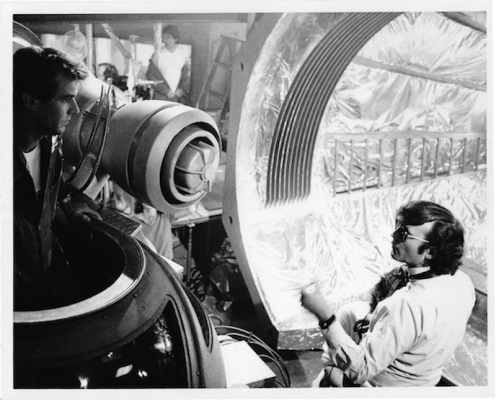Director Joe Dante made some of the best-loved films of the 1980s, including Gremlins and Explorers, so I was eager to ask him about how movies have evolved. This weekend, Dante will receive the very first Sierra Spirit Award at the Mammoth Lakes Film Festival.
Shira Dubrovner, the festival’s executive director, said Dante was chosen for his persistently independent attitude — he started his career in the indie world, and even when he made bigger Hollywood movies, they still had “his own voice and his own sensibility and his own style.”
Dubrovner also praised the way that the effects in Dante’s Innerspace (which will be screened as part of the award presentation) have held up over the past 30 years. So when I got a chance to interview Dante in conjunction with the festival, that’s the subject I started with.
“Well, I’m proud that [the effects] hold up,” he said. While “today, we’d film the same thing with entirely computer-generated material,” at the time, effects house Industrial Light and Magic built miniatures to represent the inside of the human body — Dante recalled that they “ran for almost a mile of plexiglass.”
The days of those kinds of effects might seem to be mostly behind us, as they’ve been replaced by CGI. Dante said he sees CGI as “a great thing,” but with drawbacks: “We now assume everything is fake.” For example, if a real person performs an amazing stunt, the audience might still say, “Oh, that’s not a real.”
At the same time, he pointed to Mad Max: Fury Road and Star Wars: The Force Awakens as movies that effectively combine CGI with practical and animatronic effects. Dante offered a similarly measured view on the industry’s move away from physical film. “I love film, I grew up on film,” he said. That doesn’t mean he’s opposed to shooting digitally, but in his view, “Film is still the best archival medium. … What I don’t like is the concept that, ‘Well, we’ll just put it up in the cloud and it will always be there.'”
Current movies seem to be particularly obsessed with pop culture properties from the 1980s — there’s even been talk of a Gremlins reboot. Dante sees this as “a nostalgia for a simpler view of the world.” The thing is, the 1980s probably didn’t seem so simple when they were happening. After all, Dante recalled that at the time, there was a similar look back at the 1950s. Now, “the ’80s are the new ’50s.” While Dante is probably best known for his older films, he’s continued to direct for movies and television (including two segments for the Showtime anthology series Masters of Horror).
When I asked how a director’s job has changed over the course of his career, Dante said, “People do more directing for television than they do for features because there’s less features … The jobs that are available are more likely to be on television.” Still, he said, “I don’t think it’s really changed that much.”
